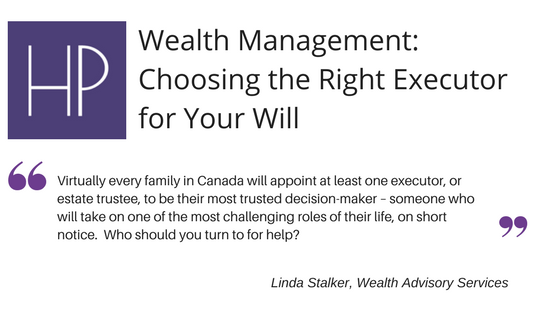Virtually every family in Canada will appoint at least one executor, or estate trustee, to be their most trusted decision-maker – someone who will take on one of the most challenging roles of their life, on short notice. Who should you turn to for help?
The overall responsibility of an estate trustee is to administer the will and ensure that the final wishes of the deceased are respected. Since it is a position of trust, choosing an estate trustee – as well as accepting the responsibility of being an estate trustee – is a decision that merits considerable thought.
It is important to understand the potentially overwhelming nature of the executor’s duties. The tasks are numerous and time consuming. Executor duties can take months or even years of work. There is technical expertise required. There may be family tensions, time constraints and personal liability. Often executors are chosen because of their relationship with the deceased or because of their profession, but if they have not had prior experience in settling an estate, it may be a daunting prospect.
As estate trustee should possess specific qualities. These include: availability, capability, sympathy, reliability and financial responsibility.
Availability: The estate trustee should be located in a geographical area close to the deceased so that the duties can be performed expeditiously and without undue expense or inconvenience. Where an estate trustee is not a resident of a Commonwealth jurisdiction, the trustee may be required to provide an administration bond, which is normally twice the value of the estate being administered.
Capability: This includes awareness that guidance may be required from lawyers, accountants and/or estate and trust professionals. These professionals can carry out any or all of the duties that you don’t feel comfortable handling yourself, while you retain your decision-making authority.
Sympathy: Settling an estate can often create family conflict or renew existing family discord. As executor you need to communicate with beneficiaries and balance potentially conflicting interests. An unbiased third party can often be an invaluable resource in managing those tensions.
Reliability: Being an estate trustee may call for business judgement in areas such as the realization of assets, dealing with insurance and a variety of other financial decisions. This means that the choice of an estate trustee should not be based solely on friendship or affection. If a business is to be continued or sold, business judgement, professional skills and basic honesty will be of particular importance.
Financial Responsibility: An estate trustee may be personally liable in certain situations, such as making investments in unsuitable assets, failing to act properly or having to pay the deceased’s unpaid income tax liability.
In short, the role requires a lawyer, accountant, mediator and psychologist all rolled into one. Before taking on the role it is important to carefully consider what you are being asked to do and whether you are well suited to the task.
If you have been appointed executor and can’t or don’t want to carry out all the duties involved in administering the estate, you have the right to decline to act before you carry out any tasks. Alternatively, you can engage a firm that provides estate and trust services at any point during the estate administration to help you with all or some of your responsibilities as executor.
Linda Stalker is the Director, Wealth Advisory Services and has extensive experience designing comprehensive financial and estate plans for individuals and small businesses, and estate trustee administration services. To learn more contact lstalker@hendersonpartnersllp.ca
